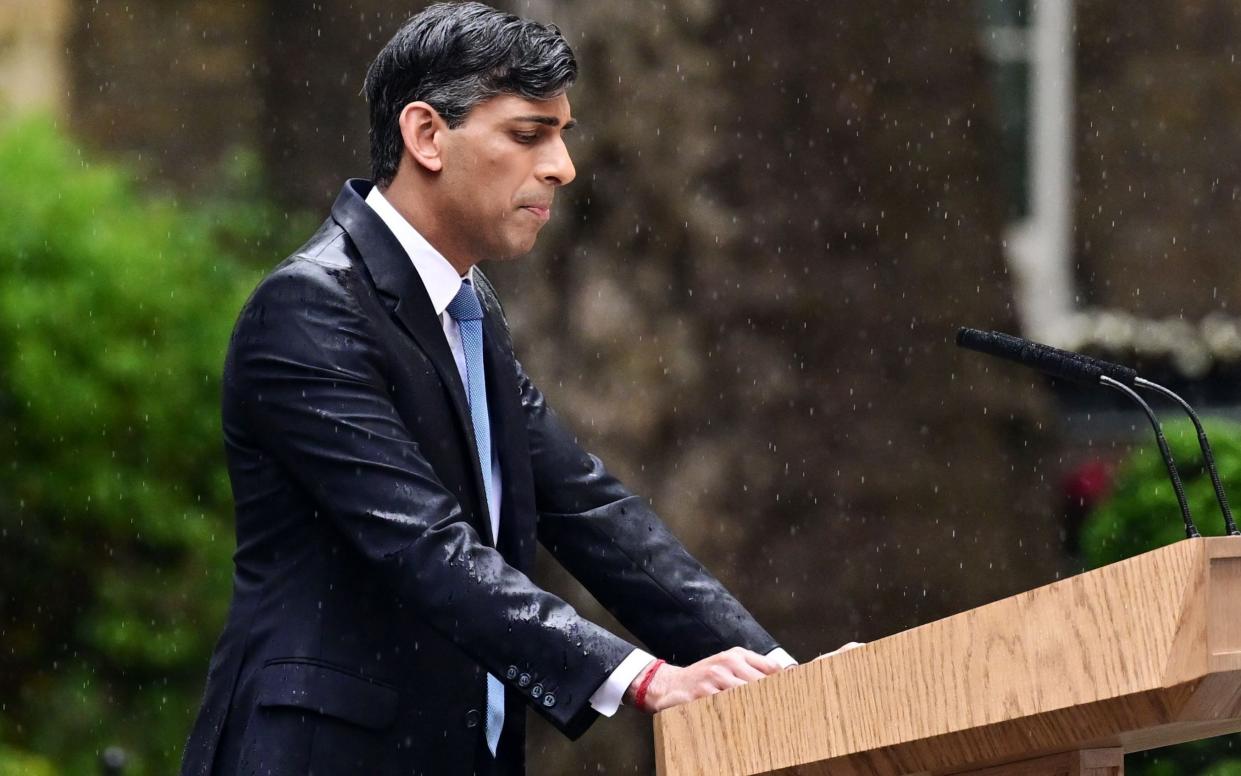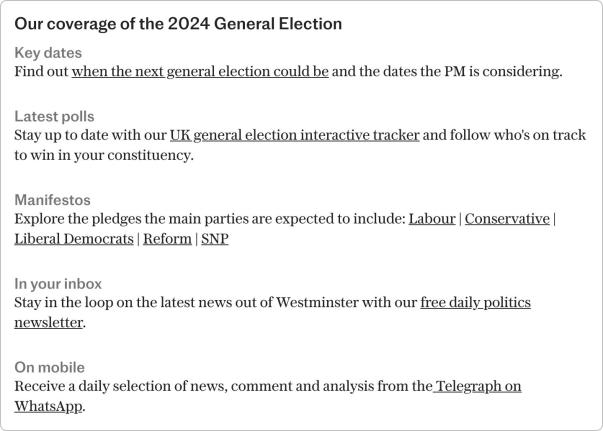Why Rishi Sunak had to go bold and call an election now

For a man who is naturally cautious, Rishi Sunak took some convincing that an early general election was the right way to go, but in the end he ran out of reasons to say no.
Good news on the economy, hopes of lift-off for the Rwanda plan and the danger that there could be bad news later in the year finally convinced the Prime Minister that the pros outweighed the cons.
So he decided, for once, to be bold and seize the initiative by going to the country on July 4.
At first glance, taking a risk on cutting short his premiership may seem hard to fathom. The polls still make for dire reading, but the logic in No 10 was that, all things considered, July makes for the least bad option.
In the “plus” column, Mr Sunak can point to a dramatic drop in inflation, a return to economic growth, lower net migration and the Rwanda deportation scheme becoming law.
Follow The Telegraph’s 2024 general election live blog.
There are fears, though, that with more and more people coming off cheap fixed-term mortgages and seeing an increase in their monthly payments, and with the small boats crisis showing little sign of abating, the bad news could outweigh the good if Mr Sunak waits until the autumn.
One of the key drivers of the decision, according to those with knowledge of Downing Street’s thinking, is that a series of big spending commitments – including an uplift in defence spending, a £10 billion compensation package for infected blood scandal victims and money for victims of the Post Office scandal – means there will be nothing left for tax cuts in an autumn budget.
And if the Budget, a government’s biggest pre-election weapon, is going to be a non-event, there is no point in waiting any longer.
As one Tory insider put it: “They have been clearing the decks with big spending plans, which means there won’t be any money left for an autumn statement. And if you haven’t got any money to give away before the election, what are you waiting for?”
In recent weeks and months, the Government has been subtly preparing the ground to keep open its options for a July election.
A promised crackdown on benefit payments and a watering down of net zero were designed to appeal to the Tory base, then in the past fortnight the stakes were raised with a speech Mr Sunak gave last Monday in which he accused Labour of being a threat to UK security, followed days later by Jeremy Hunt warning that Sir Keir Starmer would put up taxes.
Then in recent days there has been a slew of policy announcements including an increase in defence spending to 2.5 per cent of GDP.
Mr Sunak has staked his reputation on his relentless focus on bringing down inflation, and on Wednesday came the news that it was down to a three-year low of 2.3 per cent – just above the Bank of England’s target rate of 2 per cent.
That followed official figures showing that GDP growth for the first quarter of the year was 0.6 per cent, all of which played perfectly into the Prime Minister’s central election message, which is that the Tories are fixing the economy and making progress Labour would put at risk.
One government source described the announcement of the latest inflation figures as a “pivot point” that had been key to making up the Prime Minister’s mind.
There is also a belief in Downing Street that support for Sir Keir will start to crumble once “people have to focus on the actual choice” in front of them, and that polling has been skewed by the fact that the public is not really engaged in the issues at present.
Another factor that played into the decision was that after anti-Sunak plotters abandoned plans to use the local election results to oust him, he may be in a safer position now within the party than he is likely to be at any time this year.
“We can’t guarantee that there won’t be further events that could destabilise him within the party if we leave it until the autumn,” said the source.
Ironically, if there is too much good news on the economy it might make the public think there is no risk in voting Labour: better, from a Tory point of view, to convey the message that there is still work to be done, rather than job done.
As he said in his speech announcing the election: “Our economy is growing faster than anyone predicted … who do you trust to turn that foundation into a secure future for you and your family?”
He said voters would have to choose whether to “build on the progress we have made – or risk going back to square one”.
Mr Sunak’s closest aides have been torn all year over the best time to call an election. Oliver Dowden, the Deputy Prime Minister, has always favoured going early, arguing that a delay would only give Labour more time to organise.
Isaac Levido, Mr Sunak’s election strategist, prefers the idea of waiting, and is reported to have championed Nov 14 as his preferred polling day.
There are other tactical reasons for going early. There is a danger that Reform UK, already making serious inroads into the Tory vote, would be better prepared for an election by the time the autumn arrives, especially if Nigel Farage were to return as leader.
Going early denies Mr Farage the luxury of time to make up his mind.
There is also a genuine belief that the first Rwanda flights could take off during the summer, and if that were to happen during a six-week election campaign it could give the Tories a priceless boost.
And the Prime Minister can expect further good news on Thursday when new figures are expected to show that net migration, whilst still high, has fallen by tens of thousands.
There is even the hope that with England potentially playing a Euro 2024 quarter-final match on July 5 or 6 the Government will be able to tap into a feelgood factor that may by then have taken root.
He said at the podium outside No 10: “This hard-earned economic stability was only ever meant to be the beginning. The question now is how, and who do you trust, to turn that foundation into a secure future for you, your family and our country.
“Now is the moment for Britain to choose its future. To decide whether we want to build on the progress we have made or risk going back to square one with no plan and no certainty.”
Downing Street hopes that by firing the starting gun on an election campaign the entire party will put its differences aside and focus on winning, and that activists will be energised after a month in which they have suffered depressing local election results.
For Mr Sunak, it is undoubtedly the biggest gamble of his life.


 Yahoo News
Yahoo News 
